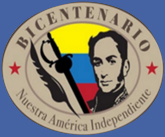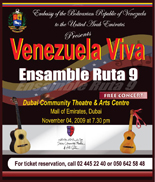
Bolivarian Republic of Venezuela
Embassy in the UAE
English | Spanish
GovernmentHugo Rafael Chávez-Frias
President of the Bolivarian Republic of Venezuela  Curriculum VitaeOn 4 February 1992 Chávez, then Lieutenant Colonel, headed a movement of young officers in an attempt to overthrow the government, which characterized itself principally by high levels of corruption. For his part in the attempt, President Chávez spent two years in prison. In December 1998, Hugo Chávez was democratically elected President of Venezuela, with an overwhelming 60% of the votes cast. He was the leading force behind the new Venezuelan Constitution adopted in 1999 through national referendum. According to such Constitution, the confirmation by the voters of many political appointments became a requisite. Although it was not necessary, President Chávez insisted that the voters be also given the opportunity of re-confirming his presidency. Chávez won this election, thus extending his term of office until 2006. President Chávez has implemented significant and wide-reaching political, institutional and economic reforms, as well as an ambitious program of social improvements, in an attempt to reconnect an apathetic and disappointed population with democracy. Far-reaching social programmers have been developed (the better known "missions", among others), benefiting numerous sectors of society previously excluded. Millions of people have now healthcare and education for the first time ever, as well as a sense of inclusion they never had in the forty previous years of democracy. President Chávez has also set in motion a reactivated international energy policy and an energetic foreign policy. In April 2002 he was briefly deposed and jailed by reactionary forces that dissolved the National Assembly, the Supreme Court as well as all the elected posts. He was reinstated to power by the overwhelming reaction of the people and the action of the institutional Armed Forces. A few months later he faced a devastating oil strike aiming at his resignation and lead by the same sectors that previously stated the April coup. In August 2004 President Chavez's mandate was submitted to a recall referendum (a figure that he introduced in the 1999 Constitution). Having won the referendum by more that all the international observers, the Carter Centre and the OAS among others, recognized 59 per cent of the votes, his triumph. Unfortunately, the same opposition leadership that attempted the 2002 coup and the subsequent oil strike, did not recognize the result of the referendum. On 3rd December 2006, President Chávez was reelected for an additional period of 6 years by a landslide of 63% of the votes, 25% more than the opposition candidate, in the most attended election in recent decades. Of the 11 electoral processes won by President Chávez since he was originally elected (constitutional referendum, presidential election of year 2000, recall referendum, etc.), this was the first one recognized by the opposition, even though all of them had been certified by international organizations such as the European Union, the Organization of American States and the Carter Center. President Chávez has headed the G-15, the G-77, the Group of Andean Community of Nations and the Group of Heads of States of the OPEC. President Chávez has five children: Rosa Virginia, Maria Gabriela, Hugo Rafael, Raúl Alfonzo and Rosa Inés. |








